Day 1:
Arrive at Nairobi's Jomo Kenyatta International Airport and meet your driver/guide and vehicle in the arrivals area. Transfer across Nairobi to your hotel.
Check-in on arrival and freshen up before enjoying the rest of the day at leisure.
Check-in time is from 14h00 - early arrivals can be facilitated if advised in advance and are subject to availability and a day fee.
Your Brothers Safaris guide for the safari will connect with you at your hotel and once everyone has arrived, we’ll meet up to introduce everyone and review the plans for the next few days.
Your stay for tonight is on a B&B basis.
Overnight Tamarind Tree Hotel.
For guests wanting to experience Nairobi National Park (Nairobi National Park | Kenya Wildlife Service (kws.go.ke) ) and the Sheldrick Wildlife Trust orphanage (Nairobi Nursery - behind the scenes (sheldrickwildlifetrust.org) ), we offer the option of booking an additional day at the start of the safari. Contact us for more information and costs.



Kenya Wildlife Services Headquarters
- Transfer from Jomo Kenyatta Airport to Tamarind Hotel
- Bed and breakfast - Tamarind Tree Hotel
- Drinks
- Dinner
- Nairobi National Park (Nairobi National Park | Kenya Wildlife Service and the Sheldrick Wildlife Trust orphanage
Days 2 - 4:
Depart Nairobi early in the morning in order to reach the Mara for lunch. You will drive over the Ngong Hills and through the Great Rift Valley before heading up the Mau Escarpment into the Mara. Depending on traffic and road conditions, this could take between four and six hours.
Spend the next three days exploring the Greater Mara area and its abundant wildlife. Game drives and activities will be tailored around the groups preferences and guided by your sightings in order to ensure maximum opportunity to view as many of these magnificent animals as possible.
You’ll discuss plans daily with your local driver/guide and African Vet Safaris guide, wildlife vet Dr Peter Brothers. You have a private game viewing vehicle and thus maximum flexibility.
A typical day’s routine is as follows:
An early wake up with coffee/tea around 06h00 to depart on a pre-breakfast game drive with your guides at 06h30.
The earlier you get out the more you are likely to see.
After 3-4 hours scouting for wildlife and birds in the reserve, return to camp to freshen up.
After a sumptuous breakfast, the middle of the day is yours to do with as you please, many people go back to their tents and have a shower, perhaps read and take a nap before lunch or play board games in the main mess/lounge area of camp.
Where feasible you will use this time to meet and interact with local researchers/visit their projects.
After lunch you typically have a few hours to relax again before heading out around 15h30 to 16h00 on an afternoon game drive – perhaps follow up on the pride of lion you saw in the morning, or head out to look for an elusive leopard or cheetah.
After the game drive it’s time for a well-deserved pre-dinner drink around the campfire back in camp. A chance to swap stories with other guests. After dinner retreat to your tent to fall asleep to the sounds of Africa.
During our time in the Mara we will meet with representatives of the Mara Elephant Project and the Hyena Research Group to learn more about their conservation work in this area.
The Mara Elephant Project aims to protect elephants and their habitats across the greater Mara ecosystem by creating a stable and healthy elephant population co-existing peacefully with people across this ecosystem.
The project was founded in September 2011 in partnership with the Government of Kenya, Kenya Wildlife Service, Wildlife Research and Training Institute, community conservancies and other conservation organizations. This partnership model with both governmental and non-governmental organizations plus local stakeholders has enabled the organization to focus on a small number of key activities by leveraging the resources of its partners to traverse great areas, collar elephants, analyse collar data, and cut across political boundaries to improve the security of elephants and reduce the rate at which they are being illegally killed.
The Hyena Research Group in the Masai Mara started way back in 1988 and has focused on multiple aspects of spotted hyena behaviour and physiology over the years. These include behavioural, anatomical, and endocrine characteristics of spotted hyenas which make them uniquely interesting animals. Since 1987 Holekamp Lab’s NSF research funds from the USA have been used to support 142 undergraduates, 57 graduate students, and 7 post-docs, including 26 Kenyans, 21 Americans from under-represented groups, and 135 women, resulting in multiple dissertations and papers being published.
In addition to training Kenyan graduate students and uplifting female scientists, these funds are also used to educate Kenyan grade-school children. Many Michigan State University graduate students living at the research camp devote one morning each week to teaching Masai children in the two local elementary schools about their wildlife and the value of its conservation.
Overnight Mara Bush Camp.
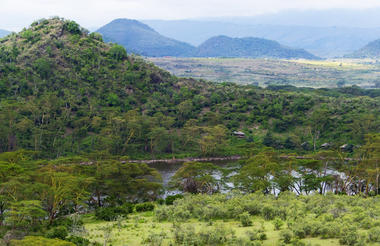
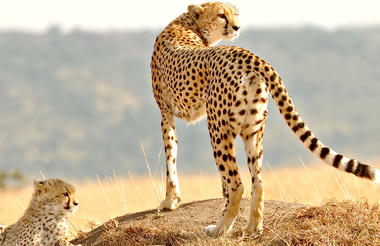
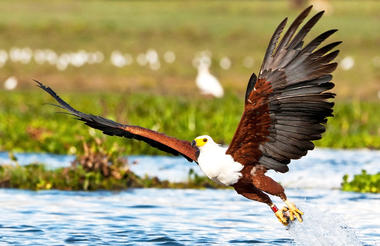
Being so close to the equator Kenya’s sunrise and sunset varies by an hour at most throughout the year. The temperature can also be comparatively cold in the early mornings and evenings, so it is a good idea to dress in layers when you go out on a drive as the middle of the day will typically be hot and dry.
Afternoon
Morning
Full board accommodation including three meals per day, filtered water, tea and coffee.
Visits to Mara Elephant Project and Hyena Project.
- Drinks (except water, tea & coffee)
Days 5 - 6:
Leave the Mara after an early breakfast and traverse the Mau to Naivasha (this drive will probably take between five and six hours). You will arrive in time for a late lunch. After check in and lunch, spend the afternoon relaxing or visit one of the nearby lakes.
After dinner we'll head out on a guided night game drive in search of some of the elusive nocturnal species.
The next day you will drive into Naivasha – approximately 45 minutes - to the Wildlife Research Training Institute (WRTI) where you will have a tour and be able to find out more about the work they do training wildlife vets and researchers from Kenya and beyond - subject to confirmation.
WRTI has been established with the understanding that the wildlife research agenda needs to be more focused in order to provide reliable scientific information on emerging wildlife conservation and management challenges for the country. The institute is expected to provide:
- Knowledge on the status of the country’s wildlife and their potential to facilitate optimised benefits from the wildlife resource;
- Capacity development through training to enhance wildlife conservation and management;
- Quality and comprehensive wildlife data and information to inform policy formulation.
Return to our lodge to discuss what we have learnt and put it into context of African wildlife conservation, or if you prefer, enjoy some leisure time after the visit, or explore the town of Naivasha before heading back.
Overnight Chui Lodge.
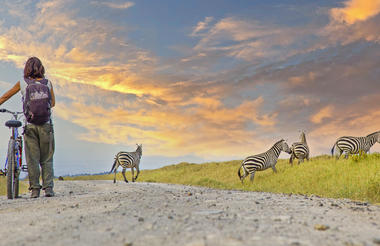
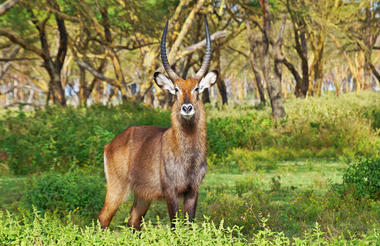
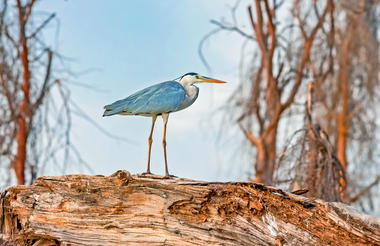
Full board accommodation including water, soft drinks, house beers & wines.
Activities: game drives, night drives, bush walks, boat rides, flower farm visit, organic farm visit, sundowner, bush breakfast at Oserengoni Wildlife Sanctuary.
Visit to MRTI Naivasha.
- Premium drinks
Days 7 - 10:
Check out after an early breakfast and head north to Lake Nakuru and around the side of the Aberdares to Laikipia (this is approximately a five-hour drive). Perhaps stop along the way for a coffee or lunch in Nyahururu before getting to Suyian Soul which you will use as your base for the next four nights.
This is another opportunity to enjoy game drives and the incredible wildlife of Kenya. The daily schedule is again flexible but will be similar to our time in the Masai Mara with regard to game drives and conservation project interactions.
During your stay you will visit Mpala Ranch – a drive of approximately 1 hour 45 minutes – for a tour to learn about the conservation work being done here, and Ol Jogi Wildlife Conservancy (subject to confirmation), as well as meeting the Suyian Ranch vet who will be able to discuss the challenges of Rangeland management, livestock and wildlife with you.
Mpala Ranch is a research centre of science, education, and outreach, created to benefit nature and people. The centre is a “living laboratory” which aims to help researchers find answers to wildlife conservation challenges. Past and current research includes projects such as looking into the survival of cheetah and the endangered African Wild Dog outside of protected areas, the ecology of the endangered Grevy’s zebra and the social structure and decision-making of Vulturine guineafowl; One Health (the link between human, animal and environmental health) and savannah ecology. You are sure to leave the research centre enlightened and challenged.
Ol Jogi Wildlife Conservancy aims to be a leading model for private conservation, with relentless efforts to pioneer new methods and techniques enabling us to protect wildlife and assist local communities. The conservancy was created over 40 years ago, with the aim of preserving natural habitats and their wildlife in a responsible manner. With this goal in mind, Ol Jogi has developed a multi-faceted approach to conservation, which encompasses preserving critically endangered species and providing them with the best medical support possible, restoring degraded natural habitats, providing a much-needed education platform to share the importance of our work, and working closely with our neighbouring communities so they can perceive a direct benefit from wildlife and natural landscapes. Facilities include a vet clinic and wildlife rescue facility which we hope to visit.
After each visit you’ll have a chance to discuss what you have learnt with your African Vet Safaris wildlife vet to put matters into context and answer any questions you might have.
Overnight Suyian Soul.



Full board accommodation including water, soft drinks, house beers and wines.
Visit Suyian Ranch, Ol Jogi, and Mpala Research Centre (Ol Jogi subject to confirmation).
- Premium drinks.
Days 11 - 13:
Check out after an early breakfast and head out on a four to five hours drive to embark on an extraordinary adventure through the captivating landscapes of Samburu Game Reserve.
Discover the untamed beauty of Kenya’s Northern Circuit, where an abundance of indigenous wildlife thrives. Witness majestic African elephants, graceful zebras, and iconic Masai giraffes in their natural habitat.
In Samburu you will meet representatives of Action for Cheetahs, Save the Elephants and Ewaso Lions to find out more about their research work and how they co-operate with Kenyan Wildlife Services to reach their goal.
Action for Cheetahs Kenya - Promoting the conservation of cheetahs through research, awareness, and community participation in Kenya.
Action for Cheetahs in Kenya is made up of a team of dedicated conservationists. Founded in 2009, ACK draws employees from communities that share space with cheetahs and their habitat. Our field scouts grew up in the communities they now advise, our scientists attended universities in Kenya, and our administration have decades of conservation and wildlife experience between them.
Save the Elephants has led the charge to save Africa’s elephants both in Kenya—where their headquarters are based—and across the world.
Elephants are among the world’s most intelligent, sensitive and social animals, possessing both empathy and family values. They live in close family groups that over the years have been torn apart by an epidemic of poaching across Africa that is fuelled by a growing demand for ivory. Tens of thousands of African elephants continue to be killed each year for their tusks.
Save the Elephants (STE), founded by renowned elephant expert Dr. Iain Douglas‐Hamilton more than 25 years ago, serves as a long‐term protector of elephants and as their voice and advocate on an international stage.
STE conducts research into the ecology and behaviour of wild elephants, providing deep insights into the challenges they face and forging science-based solutions for a harmonious future between elephants and humans. The organization’s research closely follows the wild elephants in STE’s northern Kenya study area in intimate detail, and through tracking elephants in various sites across Africa provides crucial details on the land elephants need in order to thrive. STE is working for peaceful coexistence between humans and elephants and provides outreach around the world to help secure a better future for elephants.
Ewaso Lions is dedicated to conserving lions and other large carnivores by promoting coexistence between people and wildlife. The organisation is an independent 100% African wildlife conservation organisation which engages and builds the capacity of key demographic groups (warriors, women, elders and children) by developing approaches to reduce human-carnivore conflict. Their conservation landscape includes three protected areas - Samburu, Buffalo Springs and Shaba National Reserves - and eleven Community Conservancies in northern Kenya. The organisation raises awareness of ecological problems to spur solutions from within the local communities, and conducts research and educational initiatives that reinforce traditionally held beliefs and the evolving culture of wildlife conservation across the landscape.
Overnight Larsens Camp

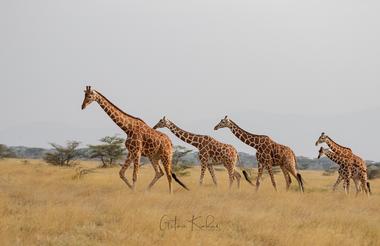
Full board accommodation including water, soft drinks, house beers and wines.
Visit Action for Cheetahs, Save the Elephant & Ewaso Lions.
- Premium drinks.
Day 14 :
After a last breakfast in Samburu you will be dropped at the Samburu airstrip for a 12h10 scheduled flight to Nairobi's Wilson Airport, which is scheduled to arrive at 13h15. On landing you will be met by two vehicles and their drivers.
They are yours to explore Nairobi for the afternoon and evening until you are dropped at JKIA for your international flight home.
Hotel day rooms can be arranged in advance for those preferring this – for your own expense.




